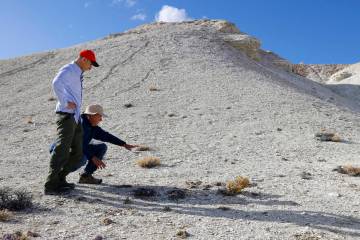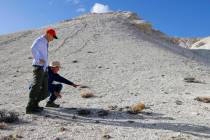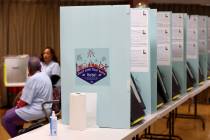Outbreaks investigated at 9 hospitals, 3 nursing facilities
State and federal health regulators are investigating outbreaks of a drug-resistant “superbug” that can lead to serious illness at nine hospitals and three skilled nursing facilities in Southern Nevada, the state health department disclosed Wednesday.
Overall, 19 facilities — 16 hospitals and three nursing facilities — have reported recent cases of the Candida auris fungus. But not all of these facilities are experiencing outbreaks, according to the state Department of Health and Human Services, which is investigating cases at acute-care hospitals, long-term acute care hospitals and skilled-nursing facilities.
From Jan. 3 to Monday, 73 clinical cases of C. auris were identified and 92 cases in which the individuals were “colonized” with the fungus but did not have an active infection. Colonized individuals have no symptoms of infection but have the fungus somewhere on their bodies, allowing them to spread the disease.
The state provided the data in a detailed response to an inquiry by the Las Vegas Review-Journal, which reported the outbreaks Tuesday.
“As we have seen in Southern Nevada, C. auris has caused outbreaks in health care facilities and can spread through contact with affected patients and contaminated surfaces and equipment,” the department said in its response.
C. auris can cause blood infections and even death, particularly in hospital and nursing home patients with serious medical problems. More than 1 in 3 patients die who have an invasive C. auris infection, such as one affecting the blood, heart or brain, according to the Centers for Disease Control and Prevention, which has deployed a team to Southern Nevada to help in the investigation.
The state health department said there had been some deaths among Nevada patients with C. auris, but it was unclear if the deaths occurred because of the infection or other factors. It did not specify how many deaths.
The most common symptoms of an invasive infection are fever and chills that don’t improve after antibiotic treatment for a suspected bacterial infection.
CDC deploys team
The state Office of Public Health Investigations and Epidemiology has been investigating the outbreaks since mid-April. The office is working with each health care facility and the CDC “to combat the spread of Candida auris by understanding its transmission methods,” the state health department said.
Health regulators are identifying gaps in infection-prevention practices at facilities, educating as needed on C. auris, and reviewing facility policies and procedures aimed at stopping transmission, the department said.
The CDC has deployed a team to assist in screening cases and addressing transmission within the health care facilities. The team will “visit health care facilities experiencing an increase in cases to perform environmental sampling, record extraction, observations, and staff interviews.”
Neither the state health department nor the CDC has identified which facilities in Southern Nevada are “experiencing increases in cases.”
But employees at Sunrise Hospital and Medical Center were told that the CDC will be on site this week and speaking with staff. A representative of the Sunrise Health System, which includes three acute-care hospitals, said it was not releasing any figures on cases.
University Medical Center said Tuesday that it had identified a cluster of cases. St.Rose Dominican said it had identified one case across its three hospitals. The Valley Health System declined to say whether cases had been identified at any of its six acute-care hospitals.
Tough to treat, prevent
Healthy people typically do not develop C. auris infections, the state said.
“Most people who get severe Candida infections are already sick from other medical conditions, live in medical facilities such as nursing homes, have had medical treatment outside the U.S., or have lines or tubes that go into their bodies,” it said.
These factors put individuals at higher risk for infection, as does recent surgery, diabetes, broad-spectrum antibiotics and antifungal use.
Candida auris, first identified in Japan in 2009, is a serious global health threat, according to the CDC. Once rare, the infection has become more common and is often resistant to multiple drugs typically used to treat Candida infections. Some of its strains are resistant to all types of antifungals.
In 2021, there were nearly 1,300 reported confirmed or probable cases of C. auris, according to CDC data, with cases in the low triple figures in California, Florida, Illinois and New York. Nevada had two reported cases last year.
C. auris infections are not only difficult to treat but difficult to prevent. The fungus “can colonize patients for many months, persist in the environment, and withstand some commonly used health care facility disinfectants that are not specific to removing C. auris from surfaces,” the state said.
However, it said, “early detection and infection control can limit the spread of C. auris.”
Contact Mary Hynes at mhynes@reviewjournal.com or 702-383-0336. Follow @MaryHynes1 on Twitter.























